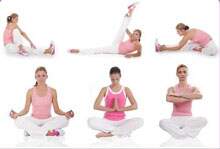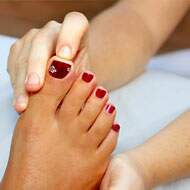How To Induce Labor with Acupressure and Massage
Acupressure, the ancient oriental art of healing, is a technique that has been derived from acupuncture.
While acupuncture involves the use of needles placed at precise locations along the meridians of the body, acupressure uses pressure from the fingers to achieve similar results.
Acupressure massage is useful for inducing shorter labors and making them less painful. It has been noticed that pressure applied on certain points of the body have been effective in stimulating contractions and inducing labor, as well as lessening the intensity of pain associated with labor. While no real scientific proof exists that shows the effectiveness of acupressure in inducing labor, there is enough anecdotal evidence available to suggest that it can benefit a woman by inducing labor and lessen the pain. However, the acupressure massage should only be administered by a qualified massage therapist who knows exactly which points to massage and which points to avoid.
Acupressure Points
Acupressure involves the application of pressure on specific points on the body. The pressure is applied with the thumbs and fingers. The right amount of pressure applied on the appropriate points can help the cervix to dilate and start contracting. Acupressure points to help induce labor include:
- Large intestine 4 – This point is located on the top of your hand on the webbing between your thumb and forefinger. Massaging this area at an angle affects the large intestine that surrounds the uterus and is helpful for stimulating contractions. It also has a calming effect on the mind.
- Spleen 6 – This point can be found by placing four fingers above the ankle bone on the inner side of your ankle. Pressure applied on this point can help ready the cervix for labor and can stimulate contractions.
- Bladder 32 – This point is located one finger width above the crease of the buttocks in a small indentation.
- BL 60 – This point is located between the ankle bone and the Achilles tendon. Massaging it can help stimulate your baby’s descent.
Acupressure Massage
These spots have to be massaged using a circular motion. The pressure applied should be enough to induce soreness or tenderness but should not be painful. The massage should continue until the contraction has subsided and can be repeated up to six times a day.
There are a few points to remember when considering acupressure therapy during your pregnancy.
Acupressure massage to induce labor should be used only after you are 40 weeks pregnant or are overdue.
The massage should only be administered by a qualified and experienced acupressure therapist. Pregnancy carries with it its own inherent risks.
Two lives are at stake here. Application of pressure at the wrong points can have an adverse effect on your health and may even affect the outcome of the pregnancy.
You must consult your doctor or health care provider before retaining the services of an acupuncture therapist.
The acupressure massage can help to relax you. This is due to the influence certain points have on the secretion of adrenalin by the adrenal glands. High levels of adrenalin have been known to decrease or slow down contractions and may even be responsible for delaying the onset of labor. Stress is a major factor in life today, and acupressure massage can help offset the negative impact it has on your pregnancy.
Foot Massage
There are two pressure points for the uterus that are located on the ankle. The first point is located just behind the bony protuberance on the outside of the ankle. The next one is rather more difficult to find being located on the inside of the leg above the ankle and behind the shin bone. This point is the more sensitive of the two. Massaging these points by pressing with the thumb for about one minute can help to stimulate contractions.
Hand Massage
Massaging the Large intestine 4 or Hoku point located between the thumb and the pointer or forefinger can help to relieve pain during labor and can also calm the mind. The point should be pressed or massaged in a circular motion for one minute and can also be used during active labor.
Back and Shoulder Massage
Massaging the back in the area above the buttocks and in the neck and shoulder region can also be very relaxing. The triangular muscle from the neck to the shoulder is one of the first muscles to tighten up due to stress. Massaging this region can help to loosen these muscles and relax the mind.
Nipple Massage
Gently rubbing the areolas of the breasts can help to stimulate the flow of breast milk and relieve soreness in the breasts. The secretion of breast milk is regulated by pregnancy hormones and may also help to induce labor.
It is very important that you check with your doctor before you actually choose massage therapy in pregnancy. This is because, if not done properly it will cause lifelong harm to you and the baby.
 Find Pose
Find Pose

